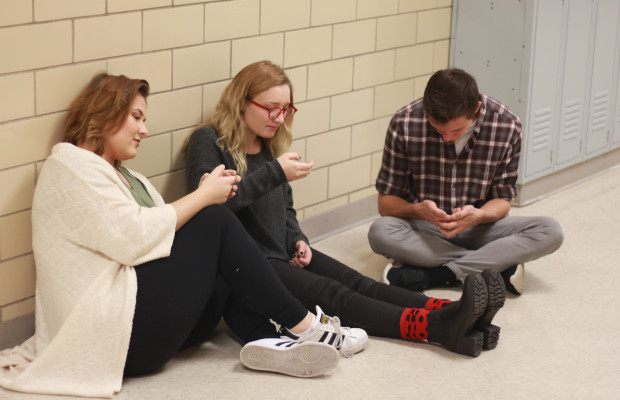Tuned Out: New study shows teens spend more time on entertainment media than sleeping

By: Allie Taiber
From the minutes we spend on the toilet, to walking from class to class, and furthermore till the day we die, our cell phones are constantly by our sides, they are crutches trumping our most significant moments and clouding our worlds as we orbit around technology and smart phones in increasingly faster revolutions.
Growing up in this technological revolution has caused us to be victims of consumption. From the screens consuming our eyes to the idea of living in accordance to media to the astounding numbers of texting-while-driving car accidents, we are victims.
It’s warped us into living through lenses. Mobile attachment to the Internet is most common among American teens, and the cell phone has become an especially important access point. About three in four teens aged 12-17 (74 percent) say they have access to the Internet on cell phones, tablets and other mobile devices with no problem.
Studies vary regarding teens total time watching TV, listening to music, surfing the Web, social networking and playing video games, but according to a 2010 study of 8- to 18-year-olds conducted by the Kaiser Family Foundation, today’s teens spend more than seven and a half hours a day in digital media, and a new study released last week by Common Sense Media, a San Francisco-based non-profit that tracks children and their technology use, finds teens aged 13 to 18 now spend almost nine hours a day on media. In other words, teen are piling up more screen time than sleep time.
As part of the first U.S. generation to be so closely identified with technology, we’re often referred to as the Facebook generation or the digital negatives. We live a double life through our screens, constantly concerned about how we are perceived by our peers and the individuals on the other side of the screen.
Is my Instagram flow acceptable? Will I get enough likes, retweets or favorites? The truth is, those things are truly insignificant. We’ve learned to view the world through a pixelated picture, always more concerned about capturing a photo of our experiences rather than taking time to appreciate each and every moment.
Despite the many negatives, this technological evolution has also provided our society with greater resources. As digital media becomes more integrated into daily teenage life, child development and education experts have begun to identify the unique opportunities it offers, including easier access to information and new opportunities for learning, as well as the negative impacts on adolescents, particularly the development of their social skills.
Worry has sparked due to the fact that teens spend so much time interacting with each other on social networks and phones that they are growing less comfortable with in-person interactions and not developing essential social skills.
Many of us have developed the skill of Internet friends as we comment on or like one another’s photos, message them, etc., but as we walk through the halls, a simple hello to a stranger is almost unheard of.
The gift of face-to-face human interaction has the ability to shape friendships and bind our society together, but we are driving a wedge through our connections to our neighbors as we continue to be consumed by our smart phones.
It’s almost unheard of to walk into a social setting these days and not see at least half of those present drowning in their social media or messages, so it’s up to us whether or not we chose to pursue life on the other side of the screen without our right hand man (literally).









You must be logged in to post a comment Login